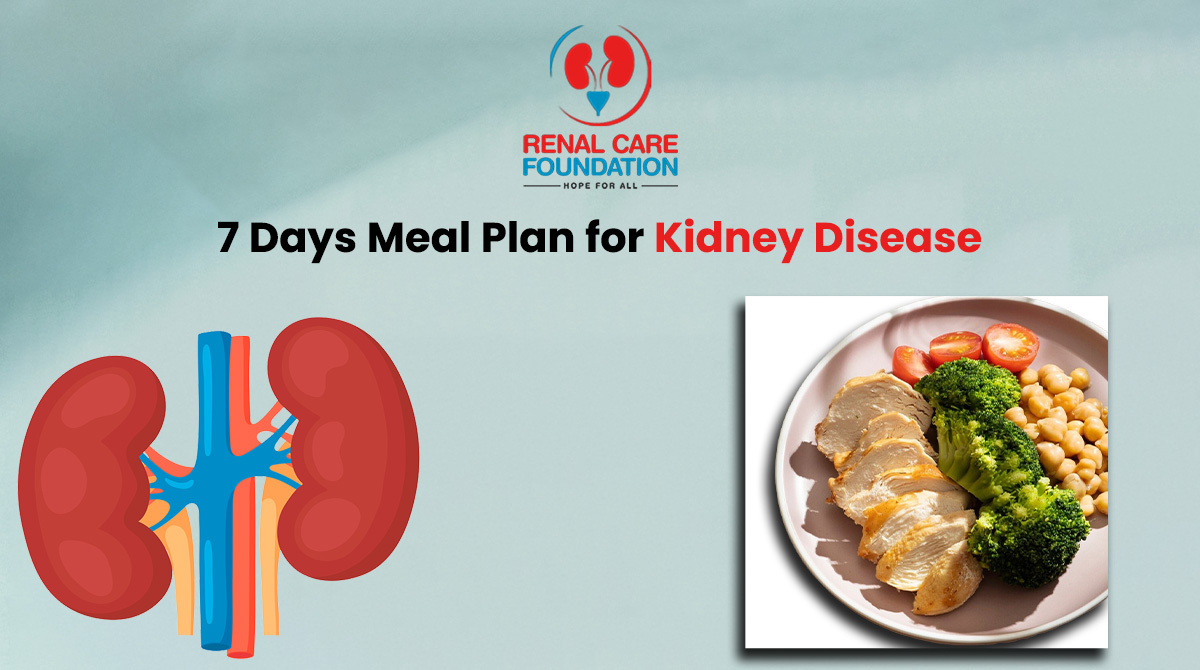


Discover a 7-day meal plan for kidney disease that includes kidney-friendly meals, low-potassium foods, and advice from a renal dietitian for managing kidney disease and diabetes.
Kidney disease affects millions of people worldwide, and managing it properly requires not only medication but also a carefully tailored diet. A renal diet is vital for individuals with kidney disease to manage symptoms, prevent further damage, and improve overall well-being. Understanding the components of a kidney-friendly diet, such as controlling potassium, phosphorus, and sodium intake, can make a significant difference.
In this article, we'll learn about a comprehensive 7-day meal plan for kidney disease, offer insights on how to incorporate low-phosphorus foods for kidney patients and explore how renal dietitians can help create the best dietary plan for each individual.
A renal diet is designed specifically for people with kidney disease. Diet therapy primarily aims at restricting the consumption of specific nutrients that the kidneys struggle to process, like sodium, potassium and phosphorus. By changing their diet accordingly, individuals living with kidney disease can reduce the workload on their organs while simultaneously decreasing harmful substances entering their bloodstream.
Renal dietitians are nutrition experts with expertise in kidney disease who help individuals create personalized meal plans. Renal dietitians play an invaluable role in guiding as to which foods to include or avoid for optimal kidney health while simultaneously making sure patients get all necessary vitamins and nutrients while limiting harmful ones.
An effective seven-day meal plan for kidney disease patients can play an invaluable role in controlling their nutrition intake and supporting kidney health. By keeping potassium, phosphorus, and sodium intake at optimal levels, this structured plan ensures you eat appropriate portion sizes while making smart food decisions which promote overall wellness.
The first day focuses on managing potassium and phosphorus levels. For breakfast, opt for an egg white omelette with spinach and a small serving of fruit. Lunch could consist of a turkey sandwich on whole-grain bread with cucumber and a small portion of strawberries. For dinner, try grilled chicken breast with steamed carrots and mashed potatoes.
For Day 2, include a kidney-friendly breakfast of oatmeal with almond milk topped with blueberries. For lunch, enjoy a grilled chicken salad with low-fat dressing, spinach, and a small portion of quinoa.
Dinner on Day 3 could feature baked salmon with steamed broccoli and brown rice. This meal balances protein, fibre, and healthy fats while being low in potassium and phosphorus.
It's important to balance carbohydrates and protein in a kidney-friendly diet. On Day 4, a great dinner option is roasted turkey with sweet potatoes and a side of green beans. This meal provides the right amount of energy and essential nutrients without overloading the kidneys.
Day 5 focuses on individuals managing both kidney disease and diabetes. A hearty breakfast of scrambled egg whites with avocado, tomatoes, and a small serving of whole grain toast will keep your blood sugar stable while meeting kidney dietary needs. Lunch could feature grilled chicken with roasted vegetables and quinoa.
For Day 6, try a low-potassium diet with a lunch of turkey breast and mixed greens salad. For dinner, enjoy baked tilapia with steamed asparagus and a small serving of brown rice.
On the final day of the meal plan, enjoy high-quality protein options such as grilled shrimp with a salad of mixed greens, cucumbers, and a light vinaigrette. Avoid foods high in phosphorus, such as dairy, and incorporate kidney-friendly proteins like fish and lean meats.
Diet is key when managing both diabetes and kidney disease simultaneously, so the right choices when selecting foods for both conditions should be prioritized. When making food selections for these conditions choose low-potassium foods like apples, berries, and grapes; low-phosphorus foods like rice, pasta egg whites etc.. Avoid processed foods high in sodium, as they can worsen both kidney disease and blood sugar control.
Common low-potassium foods for kidney patients include apples, blueberries, strawberries and white rice - these food choices are gentle on kidneys while helping keep potassium levels balanced.
Staying on a renal diet requires careful consideration, with key tips including reading food labels, restricting processed food consumption and tracking portion sizes. Consulting regularly with a renal dietician is also advised to stay on course and adapt to changes in your condition.
Managing kidney disease with a balanced and kidney-friendly diet is a powerful tool for maintaining health and preventing complications. A 7-day meal plan for kidney disease provides structure and clarity, ensuring that individuals with kidney disease can make the best food choices. Incorporating low phosphorus foods for kidney patients and consulting with a renal dietitian can further optimize health.
Q1: Can a Kidney Disease Diet Be Used for Diabetes?
Yes, a kidney disease diet can be adapted for individuals with diabetes. Focusing on low-potassium, low-phosphorus foods, and balancing blood sugar levels is key.
Q2: How Can I Know If I Need a Renal Dietitian?
If you're managing kidney disease, it's a good idea to consult with a renal dietitian to create a personalized meal plan that addresses your unique needs.
Q3: Can Kidney Patients Eat Fruit?
Yes, kidney patients can eat fruit. However, they should focus on low-potassium options like apples, berries, and grapes.
Q4: What Are the Best Sources of Protein for Kidney Disease?
Lean proteins such as chicken breast, turkey, fish, and egg whites are ideal for kidney disease patients. These options provide essential nutrients without overloading the kidneys.